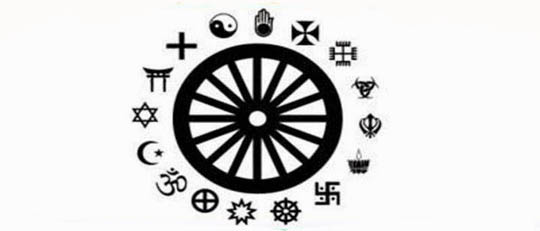So…are we or aren’t we a secular nation? Well…Constitutionally Speaking — Yes!…Realistically Speaking — No!! And just in case that answer confounds you, don’t worry…for I am going to ease your confusion and set the record straight. However, in order to do that, I am afraid we will have to take a leisurely stroll down the etymological lane.

You see, the term — Secularism — actually originated in circa 1846 from the Latin term ‘saecularis’, which simply means “temporal” or “worldly” — or in other words “relating to worldly affairs as opposed to spiritual affairs”. So what does that effectively mean? Well…what it actually means — and rather, ironically! — is that the moment you so much as even utter the word ‘religion’, you are no longer secular. Thus, if we had only cared to study the origin of the word itself (before we went about including it in the Preamble of the Indian Constitution, bringing in the term through the 42nd Amendment enacted in 1976), we would finally come to realise that what we have in India is the exact opposite of secularism, whatever that may be. This is because neither the Indian constitution nor the laws of the land have cared to define the relationship between religion and state.
In fact, we may actually have to coin a new word to define the strange state of secularism that we practice in this country, assuming it to mean ‘secularism’. Truth be told, our politicians don’t need a salary hike, but what they do need is a compulsory lesson in language. In fact, truth be told, at most we need to send all politicians back to grammar school; at least, let us gift them all a pocket dictionary (but nothing larger, mind you…for anything larger — and then they will start hurling that at one another in Parliament).
Of course, in case they do not sign up for the free lessons in language, we can always resort to some well-timed blackmail…in the holy name of Gandhi again…albeit this time, it will be a person whose actual surname was Gandhi (and not the ones who merely pose as Gandhis). Thus, in the name of the father, the son and the holy spirit, let us invoke the spirit of our father – aka – the father of this nation, Mohandas Karamchand Gandhi, who once said: “If I were a dictator, religion and state would be separate. I swear by my religion. I will die for it. But it is my personal affair. The state has nothing to do with it. The state would look after your secular welfare, health, communications, foreign relations, currency and so on, but not your or my religion. That is everybody’s personal concern”.
And that — ladies and gentlemen — is the true meaning of the word – secularism. A political state where religion and state stay separate. A state where politicians work solely towards improving the worldly lives of the people, which people practice their religions – alone and at peace. Sadly — and unfortunately so! — that is not the case with India. I know what you are thinking. But if secularism means ‘keeping religion and state separate’, why has India not been able to stick to the lexicon?
The reason is simple! We still bear the curse of the British, who played petty partisan politics in the name of religion through their distasteful policy of divide-and-rule. Even as the colonial masters left us to our own devices — they forever drove a stake through the heart of the country, dividing it in the name of religion. But what they thereby managed to do in the process is instil a deep divide — in the name of religion — amongst its citizens and denizens alike. Thus, we are a secular nation as per our Constitution but the dictionary tells us a different story!
































Well explained the meaning of secularism..hope politicians are reading your blog….